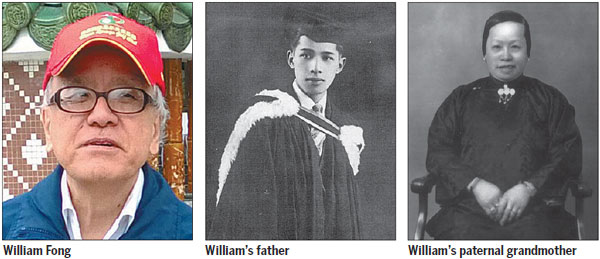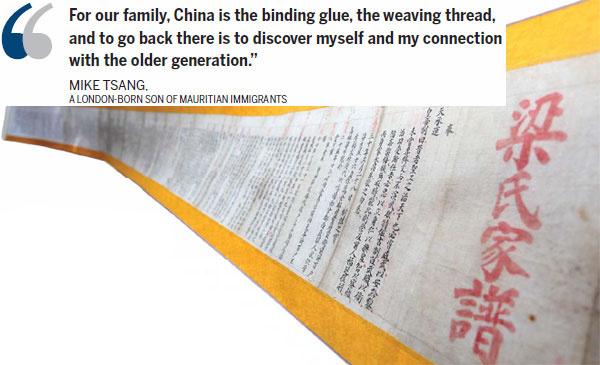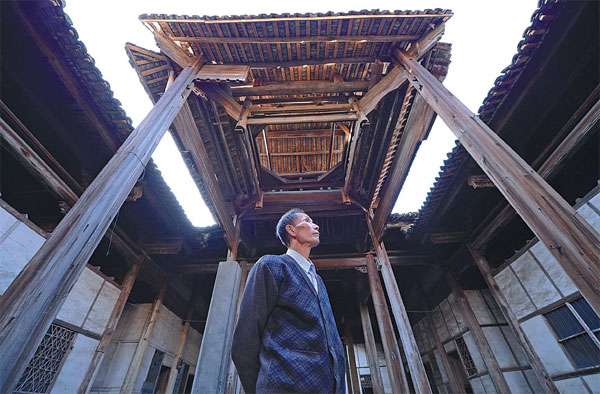Conneting with their Chinese roots

While often emotional, sometimes eventful and occasionally frustrating, more and more ethnic Chinese are searching for their ancestral homes
For Mike Tsang, the London-born son of Mauritian immigrants, whose grandparents came from China, taking a journey to Meixian in South China's Guangdong province was a way to trace his long-winding and still-evolving family saga back to its origin.
Both his paternal and maternal grandparents lived in Meixian before they moved to the island nation off East Africa in the 1930s.
| An introduction to a typical Chinese family tree. Photos provided to China Daily |

But while he visited China years ago, his much more recent urge to find his roots was, at first, almost an afterthought.
"I visited China in 2001, backpacking in its south and west, although I was too young at the time to fully understand the connection between me and the ancient country," says the 32-year-old.
The full impact of the trip, which lasted for 30 days, started to sink in only many years later when Tsang, a mathematics student, discovered his calling in art.
From Feb 23 to April 1, a photo exhibition curated by Tsang will be shown at the London School of Economics and Political Science. Titled "Between East and West", the exhibition uses compelling images to document the stories of 15 British-born Chinese and their families.
"In retrospect, the exhibition is a natural outcome of that tour, which prompted me to look ever closer into my own identity," says Tsang, whose Mauritian-born parents moved to the United Kingdom in the 1960s.
"Mauritius has an established Hakka Chinese community of around 25,000 people, which is less than 2 to 3 percent of the entire population. Yet Chinese food and arts have a big influence there, so the Chinese diaspora seems to be bigger than it actually is.
"Although my parents have never visited China, they identify with Chinese culture, practice Chinese traditions and celebrate traditional Chinese festivals. They consider themselves to be Chinese, and made me value such things as academic achievements, as most Chinese parents would do," says Tsang. "For our family, China is the binding glue, the weaving thread, and to go back there is to discover myself and my connection with the older generation."
Conneting with the older generation - that's how William Fong, a historian and Chinese-Canadian, felt when he smelled the first whiff of steamed fish in his ancestral village in Guangdong province.
"Both my paternal and maternal grandparents left their home in Guangdong for Canada at the end of the 19th century. Born in Canada, I grew up with my ultraconservative paternal grandfather, who maintained his allegiance to the fallen empire of the Qing Dynasty (1644-1911) until the end of his life, and my grandmother, who made sure I knew how steamed fish tastes," Fong says.
His grandmother never had an opportunity to return to her homeland, but she made sure Fong memorized the name of her village. "Ning Xi Li - the place I traveled to in November last year - was always at the back of my mind," the 66-year-old says.
"When I told the villagers who I was and that I belonged there, they said they knew. My grandfather had sent back my father's university graduation photo."
He was told that his father's picture hung inside the Fong family's ancestral home until the start of the "cultural revolution" (1966-76), when an overseas connection was often viewed with suspicion. "They had been preparing for my return," he says.
Fong was accompanied by Hai Miao, a 30-year-old from My China Roots in Beijing, a company that provides genealogical help for ethnic Chinese during their often emotional, sometimes eventful, and occasionally frustrating, search for their roots.
"Between the 1850s and the 1940s, countless Chinese left their homes in South and Southeast China - today's Guangdong and Fujian provinces - for destinations as close as Singapore and Malaysia and as far as the United States and Canada," Hai says.
"Driven by poverty and by hope, they set foot on foreign lands, struggled and thrived in their adopted homes. But what had happened before that? And for the younger generation, what was life like before the life they know? We unearth these long-buried stories for those who care to listen."
The company, located in a traditional part of northern Beijing, was founded by Lie Huihan, a Chinese-Dutch whose ancestors on both the paternal and maternal sides traveled to Indonesia, which was a Dutch colony, in the mid-19th century. They left for the Netherlands in the early 1950s, when the newly independent Republic of Indonesia was shaken by anti-Chinese riots.
"My parents met in Holland, where I was born and grew up. Despite their Chinese looks, they spoke no Mandarin, and knew nothing about the family's days before Indonesia," Lie says.
In 2004, he moved to Beijing and spent the next few years studying Chinese while working for a foreign investment consultancy. He also managed to unearth some family history. In 2008, with the help of a distant relative who lives in South China, he visited Shimei, a village in Fujian province.
An instant connection
"The feeling of connectedness was almost instantaneous. I kept saying to myself: They walked along this muddy road, washed in this crystalline water stream, and worshipped under the giant wooden beams of this long-abandoned village hall ... not yesterday, but 150 years ago," he says.
When he shared his story, Lie was inundated by requests for help from other overseas ethnic Chinese, who had never thought such a search would be realistic. Word spread, and eventually, it seemed logical to start a business.
My China Roots has now conducted 25 successful searches, 15 of them last year. "Imagination matters as much as perseverance, although what's lying at the end of that twisting tunnel of discovery has often come as a big surprise," he says.

Lie recalled an Australian client who asked him to gather information about his maternal great-grandfather, who left China in the late 19th century to try his luck overseas. Research in the ancestral village yielded two candidates with the right name who left at about the same time.
"According to the county annals, one fled as a result of having killed another person, while the other was a village doctor. No specific reason was given for his departure, and there were no other records," he says. "At first, my client thought the 'criminal' must be his great-grandfather, because he'd heard that his great-grandfather had a violent streak.
"We managed to find the grave of the man's mother, with her death date inscribed on the stone. Here a problem arose: Judging by the dates, this woman's son couldn't possibly be my client's great-grandfather," Lie says. "The question was laid open again, but the discovery (that his great-grandfather wasn't a murderer) was a relief to my client."
To increase search efficiency and keep prices low, the business relies on a team of field researchers who work on commission. They are mostly young, and passionate and have a strong penchant for history.
Deng Shuang, a postgraduate student at a university in Yunnan province in Southwest China, is one of them. The 24-year-old's involvement with overseas Chinese looking to learn more about their family history predates his association with My China Roots, which he came across in 2014 while conducting an online search.
"I've been freelancing for a Chinese soccer magazine since 2012, and through interviews I got to know many foreign soccer players of Chinese descent. Some were quite keen to find out about their ancestors' stories," he says.
The players included Kwong-Wah Steinraht, a former professional in the Dutch league, who is a quarter Chinese. His maternal grandfather followed the same route as Lie's grandparents from China to Indonesia and then the Netherlands about 70 years ago.
"Steinraht told me that his grandfather kept in touch with his relatives in China, until one day he received a letter from home asking him not to write again," Deng says, pointing out that it happened during the height of the "cultural revolution", and the letters may have already brought trouble to his loved ones.
Some searches are bound to come to nothing, not least because China's unprecedented urbanization during the past 20 years has obliterated many reminders of the old days, but for those who discover their family history, the meaning goes far beyond words.
Fulfilling a promise
In mid-2014, Colleen Yap, a Chinese-Singaporean, visited her ancestral home, a village of 5,000 residents in Fujian. Every resident had the surname Yap, and they all spoke the dialect she had grown up listening to.
"At my home in Singapore, we have a long wooden pole that my grandmother took with her when she left the mainland, where she used it to carry water from place to place. They talked about going back, although none of them had the chance to do so before they died," the 25-year-old says. "For me, the trip has fulfilled a promise between me and Dad whose older sister got severely sick and passed away on the ship during the fateful journey 70 years ago who made me learn ancient Chinese poems when I was small."
That feeling was shared by Liew Chee Wei, the grandson of Chinese immigrants to Malaysia, when he traveled to his ancestral home in Fujian last year. "Standing in the dilapidated room that my grandpa once slept in made me realize the courage and determination with which he had changed his own fate, and mine," the 37-year-old says. "For once, I saw the remarkableness of those seemingly unremarkable lives."
According to Hai Miao, who accompanied Fong during his trip to China, most of the visitors are emotionally overwhelmed, but some embrace their homecoming in a philosophical way.
"While walking on a country road, looking for the original site of the tomb of Mr Fong's maternal great-grandfather, we passed by three old men, all in their 80s, and stopped to ask directions," he recalls. "It turned out that one of them was responsible for destroying the tomb in the '60s. He offered to help us.
"There, on the same patch of land, stood a two-story brick house. I took a picture of them Fong and the old man in front of the house. No bitter feelings, no sense of regret. The man did what he did on the orders of the village head, probably to make room for more farmland," Hai says.
Success story
The Fong family saga is a success story. Fong's grandfather unlike many of his immigrant peers in North America who toiled to build the transnational railways served as an interpreter between the laborers and their employers, having probably learned English from Jesuit missionaries who preached and opened schools in China.
Fong's father studied at a university in Montreal, and later became associate chief engineer of the Quebec Hydro-Electric Commission, now known as Hydro-Quebec. Fong himself became an academic and writer.
"Up until his retirement, my father was the company's only employee of Chinese descent," Fong says. "But we very rarely talked, so for me the trip was to make up for our lost conversations."
Looking back, Lie says two things about his family history really impressed him. The first was the discovery that his parents were very distant blood relatives, although they had absolutely no idea of that. The other was the complete lack of surprise shown by the locals when he visited his ancestral village.
"Why should they be surprised? When my ancestors left China, they never thought it would be forever," he says. "A homecoming is a must. It may be postponed, for one reason or another, but it's only a matter of time."
Contact the writers at zhaoxu@chinadaily.com.cn.
| An increasing number of ethnic Chinese from overseas are traveling to China in search of their roots, long-lost relatives and long-buried stories. Zhou Mi / Xinhua |
(China Daily European Weekly 02/13/2015 page24)
Today's Top News
- Japan tempting fate if it interferes in the situation of Taiwan Strait
- Stable trade ties benefit China, US
- Experts advocate increasing scope of BRI to include soft power sectors
- New engine powers cargo drone expansion
- China to boost green industry cooperation
- Manufacturing PMI rises in November
































